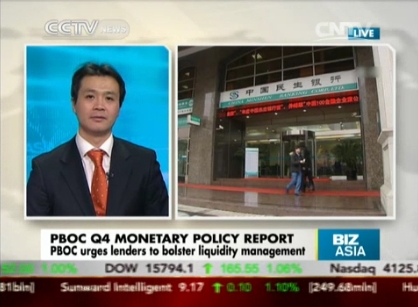 发布时间:2014-03-10
发布时间:2014-03-10
 浏览次数:6220次
浏览次数:6220次
2月10日,上海交通大学上海高级金融学院副院长朱宁教授接受CCTV NEWS《Biz Asia 》栏目的连线采访,对8号央行公布的2013年第四季度中国货币政策执行报告进行解读,并分析,这也为刚刚开始的马年奠定货币政策基调。

Host: We will talk more about the PBOC’s latest monetary policy report. Professor Zhu Ning, deputy director at the Shanghai Advanced Institute of Finance joins us tonight. Professor, so around the past year and in January of this year as well we saw expiry or maturity in short term interbank rate in China, it is interesting, because six month SHIBOR rate is actually lower than all the shorter term maturities, with the exception of the overnight rate. How does the PBOC, are using, center by these banks to better manage their liquidity?
Zhu Ning: Well, I think the PBOC would have to try really hard to get rid of the moral hazard problems which have been contributing to the collapse of financial system in the West. Basically, the banks have very strong incentives, expanding their balance sheets and trying to do more business. But under the cover of doing more business, there is more risk being created and also the banks are using up their liquidity. So I think the PBOC would have to give some more credible threats to banks which are not managing their liquidity very well. And the recent instance of credit challenge, a sort of what the PBOC is trying to do, they are trying to give some more credible treats that if you don’t manage your liquidity very well, you may face the consequences of not surviving. And one thing I think what the PBOC is going to do further probably in this year is trying to push out the long-expected deposit insurance program. With that, I think the banks would have to worry too much or far more about whether they can still survive because the saving money will be guaranteed by the deposit insurance company.
Host: Right, moral hazard problems always are very challenging issues for a policy maker to deal with. Professor, what does the Q4 monetary policy report say about how the PBOC may conduct monetary policy going forward this year? It seems like less the PBOC relies on traditional greater monetary policy leads to a better liquidity such as SHIBOR rate or moral hazard or both. And now, even in shorter term to a short term, the liquidity operation will be the dominant for going forward?
Zhu Ning: I think it is probably reflected on two aspects of the dilemma the PBOC is facing. On one hand, I think the PBOC is a sort of in a policy dilemma in the way that, well, it doesn’t want to go easing; it doesn’t want to go tightening either. So it doesn’t have a lot of directions to move at this moment. On the other hand, I think the traditional monetary policies have been intervened through the reserve rate, ratio, or the interest rate. And none of those rules are very effective at the moment. So what we are going to see more, I guess, in the entire 2014 is the PBOC is going to use more technical and the short-term rules such as reserve rate report and the SAO operations to make short term demand of the liquidity. And over the longer term, I think, the PBOC is probably going to try harder to liberalize the interest rate so that the market can determine the interest rate for financial institutions so that the financial institutions are making more responsible and making more careful decisions.
Host: Alright, well, it is certainly a flexible policy for the PBOC. Professor, I’m going to leave you there tonight, many thanks for your insight, Professor Zhu Ning, from the Shanghai Advanced Institute of Finance, joining us in the program.
Biz Asia 02/10/2014